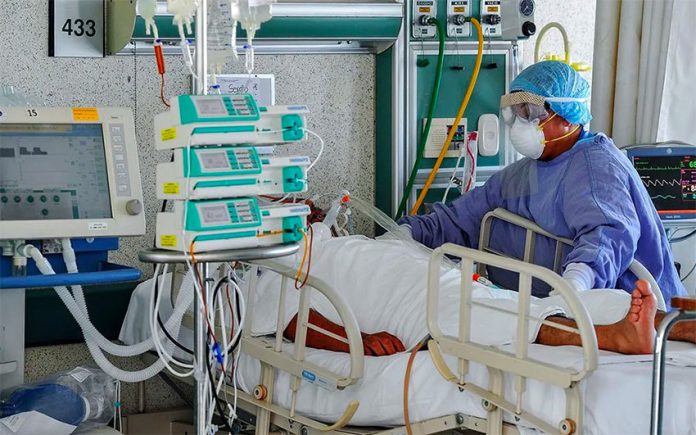Almost nine in 10 coronavirus patients placed on ventilators at Mexican Social Security Institute (IMSS) hospitals have died, according to information obtained through a freedom of information request.
IMSS told the newspaper El Universal that 17,331 coronavirus patients had been intubated at its healthcare facilities up until the beginning of October. Of that number, 15,070 – or 86.9% – had died.
IMSS hospitals in Mexico City have recorded the highest number of deaths among intubated patients, with 2,810. The next highest number occurred in México state with 1,979; Veracruz with 964; Baja California with 849; and Jalisco with 621.
Deaths of intubated patients in those five states account for 48% of all fatalities among people placed on ventilators at hospitals run by IMSS, Mexico’s largest public healthcare provider.
Death rates among coronavirus patients intubated at hospitals in some parts of the United States were comparable to the IMSS rate early in the pandemic but have since decreased as doctors have learned more about Covid-19 and how to treat it. A study published in May by a group of doctors at Emory University School of Medicine in Atlanta, Georgia, found that 35.7% of Covid-19 patients who required ventilators died.
Experts who spoke with El Universal say there are two main reasons why so many intubated patients are dying in Mexico.
One is the lack of medical personnel in intensive care wards and the other is that many patients are already seriously ill when they seek care at hospitals.
Alejandro Macías, an infectious disease doctor and member of the coronavirus commission at the National Autonomous University (UNAM), praised the federal government for quickly purchasing additional ventilators but pointed out that they are of little use if there aren’t sufficient health workers to monitor intubated patients.
“During the pandemic, intensive care beds were placed in extension areas of hospitals and that in itself can be a problem. It’s not a secret that Mexico has a lack of [critical care] specialists,” he said.
Gregorio Benítez, a medicine professor at UNAM, said that knowing how to use a ventilator goes beyond knowing how to intubate a patient. Therefore, the lives of intubated patients can be placed at risk if they are monitored by doctors who don’t have the training and experience required to operate them effectively.
“Ventilators are not medical equipment that just anyone knows how to use,” Benítez said.

“Even when the people in charge of intensive care have skill in intubating, [mechanical ventilation] doesn’t stop being risky because in the end [a ventilator] is an object that is foreign to the body. … It’s not just intubation [that doctors need to know how to do], it’s how to program the ventilator, how to adjust the … quantity of oxygen … and how to monitor the time between breaths, for example.”
Laurie Ann Ximénez-Fyvie, head of the Molecular Genetics Laboratory at UNAM, noted that many people sick with the coronavirus have waited until their symptoms are extremely serious before going to hospital. As a result, even intubation is unable to save many of them.
“A problem that the health system in Mexico has faced during the Covid-19 pandemic is that patients who require mechanical ventilation are arriving at hospital [in a] very serious [condition] with very low oxygen levels and when the probability of getting better is minimal,” Ximénez-Fyvie said.
“That [problem] is added to the lack of health personnel who are trained to attend to critical care beds.”
Macías said that as important as ventilators are, they are only one tool in the fight against the coronavirus.
“It’s not a matter of there being ventilators and magically everything is solved,” he said, adding that to give themselves a better chance of survival coronavirus patients need to go to hospital sooner rather than later.
“Unfortunately the majority of patients [who died] sought care very late. There are sick people without symptoms but with low oxygen levels. They don’t know that because they don’t have an oximeter and they don’t seek help until they feel really bad. That’s why every family should have an oximeter and check their [oxygen] levels frequently,” Macías said.
As a result, people will seek medical care sooner and there will be fewer Covid-19 deaths, he said.
The number of intubated patients who have died at IMSS hospitals accounts for about one-sixth of all officially-recorded Covid-19 fatalities in Mexico.
The official death toll currently stands at 87,415 after the Health Ministry registered 522 additional fatalities on Wednesday.
Mexico’s accumulated case tally rose to 867,559 with 6,845 new cases reported, the highest one-day increase since August 13 when 7,371 cases were registered.
Deputy Health Minister Hugo López-Gatell, Mexico’s coronavirus point man, said this week that there are “early signs” of a new wave of infections, noting that new case numbers, the positivity rate (the percentage of Covid-19 tests that come back positive) and the number of hospitalized coronavirus patients have all recently risen.
Source: El Universal (sp)
